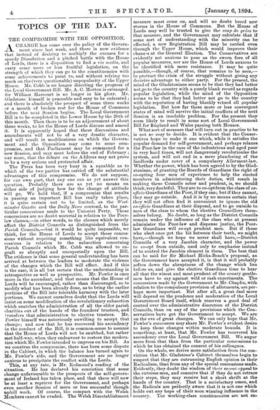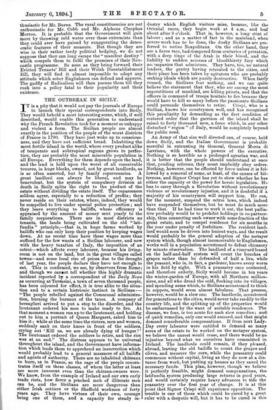TOPICS OF THE DAY.
THE COMPROMISE WITH THE OPPOSITION.
ACHANGE has come over the policy of the Govern- ment since last week, and there is now evidence that instead of desiring to multiply the excuses for a speedy Dissolution and a pitched battle with the House of Lords, there is a disposition to find a via media, and carry some more or less fruitful legislation, on the strength of which they can go to the constituencies with some achievements to point to, and without relying too much on the (very questionable) unpopularity of the Upper House. Mr. Cobb is no longer directing the progress of the Local Government Bill. Mr. A. C. Morton is estranged. Sir William Harcourt is no longer in his glory. Mr. Gladstone himself is peaceable and easy to be entreated ; and there is absolutely the prospect of some three weeks or a month of broken rest for the House of Commons before the next Session begins. The Local Government Bill is to be completed in the Lower House by the 20th of this month. Then there is to be an adjournment of about three weeks, to let the House of Lords discuss and amend it. It is apparently hoped that these discussions and amendments will not be of a very drastic character, and will result in modifications on which the Govern- ment and the Opposition may come to some com- promise, and that Parliament may be summoned for a new Session, and may meet before the end of February ; nay more, that the debate on the A3dress may not prove to be a very serious and protracted affair. The Press has been very busy in a squabble as to which of the two parties has carried off the substantial advantages of this compromise. We do not suppose, for our own part, that any one can as yet answer this question. Probably there are as yet no means on either side of judging how far the change of attitude will go. We hold that, if a compromise that results in passing an important Bill has really taken place, it is quite certain not to be limited, as the West- minster Gazette and the Daily News contend, to the par. ticular concessions made to the Unionist Party. Those concessions are no doubt material in relation to the Poor- law clauses,—in other words, to the clauses which merely affect the District Councils as distinguished from the Parish Councils,—but it would be quite impossible, we think, for the House of Lords to accept those conces- sions without requiring something like equivalent con- cessions in relation to the subsection concerning Parish Councils which Mr. Cobb was allowed to en- graft so abruptly and unexpectedly upon the Bill. The evidence is that some general understanding has been arrived at between the leaders to moderate the violence of the changes which the Bill will effect. And if this is the case, it is all but certain that the understanding is retrospective as well as prospective. Mr. Fowler is once more in the ascendant, and that means that the House of Lords will be encouraged, rather than discouraged, so to modify what has been already done, as to bring the earlier portions of the Bill into tolerable harmony with the later portions. We cannot ourselves doubt that the Lords will insist on some modification of the revolutionary subsection which snatches the administration of all the older parish charities out of the hands of the founders' trustees, and transfers that administration to elective trustees. Mr. Fowler himself was notoriously unwilling to accept that change; and now that he has recovered his ascendency in the conduct of the Bill, it is common-sense to assume that the House of Lords will not be snubbed, but rather met half-way, when they endeavour to restore the modera- tion which Mr. Fowler intended to impress on his Bill. As we construe the compromise, there has been some dispute in the Cabinet, in which the balance has turned again to Mr. Fowler's side, and the Government are no longer anxious to precipitate the conflict with the Lords.
This, at any rate, is Mr. Redmond's reading of the situation. He has declared his conviction that some change unfavourable to the prospects of the self-govern- ment of Ireland has taken place, and that there will now be at least a reprieve for the Government, and perhaps even another Session of more or less successful though uphill work. Of course, the compact with the Welsh Members cannot be evaded. The Welsh Disestablishment measure must come on, and will no doubt breed new storms in the House of Commons. But the House of may well be trusted to give the coup de greice to that measure, and the Government may calculate that if some sort of understanding with the minority can be effected, a new Registration Bill may be carried even through the Upper House, which would improve their chances at the General Election. The Conservatives are evidently not anxious to pose as the sworn foes of all popular measures, nor are the House of Lords anxious to be identified with mere resistance. It may be quite possible,—though, of course, that remains to be seen,— to protract the crisis of the struggle without giving any decisive advantage to either party. For the present, the- mind of the Gladstonians seems to be that they had better not go to the country with a purely blank record as regards- popular legislation, while the mind of the Opposition seems to be that they had better not go to the country with the reputation of having blankly vetoed all popular legislation. But how far these more or less convergent states of mind will survive the initial conflicts of the next Session is an insoluble problem. For the present they seem likely to result in some sort of Local Government Bill for England and Wales passing both Houses.
What sort of measure that will turn out in practice to be is not so easy to decide. It is evident that the Conser- vatives hope to make it one which, while it satisfies the popular demand for self-government, and perhaps relaxes. the Poor-law in the case of the industrious and aged poor in very hard times, will not dangerously revolutionise the system, and will not end in a mere plundering of the landlords under cover of a compulsory Allotment-law. Whether the power, which has been agreed to by the Glad- stonians, of granting the Boards of Guardians the right of co-opting four men of experience to help the elected members in administering their duties, will result is making these Councils sober and prudent, is, we should! think, very doubtful. They are to co-optfrom the class of ex- officio Guardians of the Poor, if they can; but if they cannot,. they may go outside. And it is by no means certain that they will not often find it convenient to ignore the old ex-officio Guardians at their disposal, and to go outside to- men of the class to whom the elective Councillors them- selves belong. No doubt, so long as the District Councils. remain under the influence of the class who at present administer the Poor-law and dispense justice, the Poor- law Guardians will co-opt prudent men. But if those who elect once get the bit between their teeth, we might have,—though we hope we never shall have,—District. Councils of a very Jacobin character, and the power to co-opt from outside, used only to emphasise instead' of to control the Jacobin element in them. The best that can be said for Sir Michael Hicks-Beach's proposal, an the Government have accepted it, is that it will probably soften down the abruptness of the change which lies before us, and give the elective Guardians time to hear all that the wisest and most prudent of the county gentle- men have to say against wild or rash experiments. The concessions made by the Government to Mr. Chaplin, with. relation to the compulsory provision of allotments, are per- haps more important. But after all, a great deal more will depend on the prudence and moderation of the Local Government Board itself, which reserves a good deal of control over the administrative discretion of the District Councils, than on any of the provisions which the Con- servatives have got the Government to accept. We are on the eve of great changes. We can only hope that Mr. Fowler's successors may share Mr. Fowler's evident desire. to keep those changes within moderate bounds. It is something, at least, that Mr. Fowler has recovered his ascendency over the Local Government Bill. We augur more from that than from the particular concessions to which he has obtained the consent of his colleagues.
On the whole, we derive more satisfaction from the con- viction that Mr. Gladstone's Cabinet themselves begin to suspect that they are outrunning English opinion in their Radicalism, than from any of the special concessions made. Evidently, they doubt the wisdom of their recent appeal to the extreme men, and conceive that if they do not retrace their steps, they may receive but a short shrift at the bands of the country. That is a satisfactory omen, and the Radicals are perfectly aware that it is not one which holds out any hope of their soon winning influence in the country. The working-class constituencies are not en- thusiastic for Mr. Burns. The rural constituencies are not enthusiastic for Mr. Cobb and Mr. Alpheus Cleophas Morton. It is probable that the Government will gain more by throwing cold water over these extremists than they could ever have gained by exaggerating the demo- cratic features of their measure. But though they are wise in their rather tardy political hedging, we do not suppose that they can long escape the " manifest destiny" which compels them to fulfil the promises of their New- castle programme. So soon as they bring forward their Evicted Tenants' Bill and their Welsh Disestablishment Bill, they will find it almost impossible to adopt any attitude which sober Englishmen can defend and approve. The gadfly of Radicalism will then pursue them till they rush into a policy fatal to their popularity and their existence.











































 Previous page
Previous page